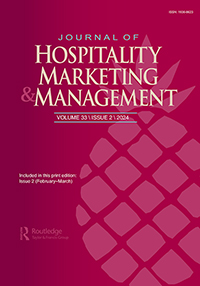Does dysfunctional customer behavior really impact the turnover intention of hotel guest-contact employees? The role of wisdom leadership and job embeddedness
IF 11.9
1区 管理学
Q1 BUSINESS
Journal of Hospitality Marketing & Management
Pub Date : 2022-11-04
DOI:10.1080/19368623.2023.2137721
引用次数: 7
Abstract
ABSTRACT The study highlights how dysfunctional customer behavior affects the hotel’s guest-contact employee turnover intention by performing the role of wisdom leadership and job embeddedness. The model was tested using data collected from 325 guest-contact employees in Omani 4 and 5-star hotels. The results suggest that dysfunctional customer behavior increases the likelihood of employee turnover. Wisdom leadership plays a mitigating role in the relationship between dysfunctional customer behavior and employee turnover. Female respondents supported the notion that employees’ cognitive rumination is positively related to employee turnover intention and that customer dysfunctional behavior has a positive relationship with employee turnover. Emotional exhaustion partially mediates the relationship between dysfunctional customer behavior and employee turnover. However, cognitive rumination and employee stress do not mediate the relationship between dysfunctional customer behavior and employee turnover. On the other hand, males showed better support on the basis that wisdom leadership moderates the association between dysfunctional customer behavior and employee turnover. The paper concludes by contributing various implications and directions for future research.不正常的顾客行为是否真的会影响酒店客人联系员工的离职意愿?智慧领导和工作嵌入的作用
摘要本研究通过智慧领导和工作嵌入的作用,强调了功能失调的顾客行为如何影响酒店客人接触员工的离职意愿。该模型使用从阿曼4星级和5星级酒店的325名客人联系人收集的数据进行测试。结果表明,不正常的客户行为增加了员工离职的可能性。智慧领导在功能失调的顾客行为与员工离职的关系中起缓和作用。女性受访者支持员工认知反刍与员工离职倾向正相关,客户功能失调行为与员工离职正相关。情绪耗竭在功能失调顾客行为与员工离职之间起部分中介作用。然而,认知反刍和员工压力并没有中介顾客功能失调行为与员工离职的关系。另一方面,男性表现出更好的支持,基于智慧领导调节功能失调的客户行为和员工离职之间的关联。文章最后提出了未来研究的启示和方向。
本文章由计算机程序翻译,如有差异,请以英文原文为准。
求助全文
约1分钟内获得全文
求助全文
来源期刊
CiteScore
20.90
自引率
6.40%
发文量
33
期刊介绍:
The Journal of Hospitality Marketing & Management serves as a peer-reviewed platform dedicated to advancing understanding, practice, and education in hospitality marketing and management. It strives to foster the development of knowledge and theory by promoting new ideas, models, approaches, and paradigms. Embracing a multifaceted approach that spans administrative disciplines, liberal arts, and social sciences, the journal disseminates knowledge through high-quality, peer-reviewed research papers, reports, and book reviews. It stands as a unique forum for the community of students, academics, and practitioners who share a common interest and commitment to the field of hospitality marketing and management.

 求助内容:
求助内容: 应助结果提醒方式:
应助结果提醒方式:


